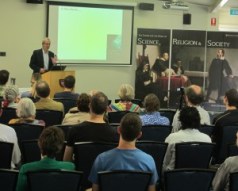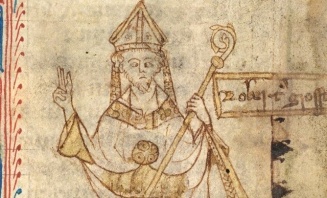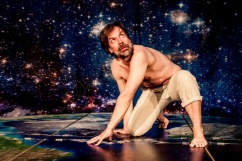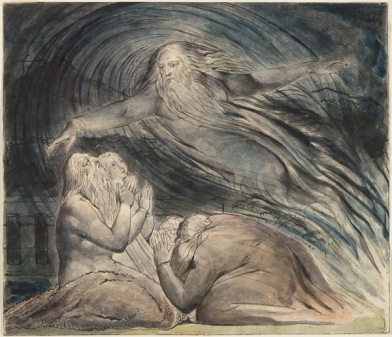This is an article commissioned from me from the American Physics Journal Physics Today. With their permission I am republishing it here for readers of this blog,
Maintaining the “alternative fact” that science and religion, and in particular Christianity, are in conflict is hurting science. Over the past year, three occasions have left me with strong visual memories and deep impressions that point towards a better approach.
The first, held at St John’s College of Durham University in the UK, was a debate on the sensitive topic of ‘fracking’—shale-oil recovery by hydraulic fracturing. I have witnessed several such discussions, both live and broadcast, and they rarely succeed in anything except escalating entrenched positions and increasing misinformation and fear; few participants bother to treat the science with respect.
 This gathering was different. Strongly opposing views were expressed, but their proponents listened to each other. Everyone was keen to grasp both the knowns and the uncertainties of the geological science and technology. Social science and geophysics both drew sustained civil dialog. The notion of different priorities was understood—and some people actually changed their views.
This gathering was different. Strongly opposing views were expressed, but their proponents listened to each other. Everyone was keen to grasp both the knowns and the uncertainties of the geological science and technology. Social science and geophysics both drew sustained civil dialog. The notion of different priorities was understood—and some people actually changed their views.
The second occasion was some reading I have been doing for a book on the role of creativity and imagination in science. Research for one chapter had led me to connections between the explosion of new science in the 17th century and ideas from the same period expressed in literature, art, and theology.

Those ideas included a discussion of the nature of God to a depth unseen since the fourth-century ecumenical councils. One treatise impressed me hugely with its author’s detailed knowledge of textual analysis, variants in New Testament manuscripts, and nuances of Greek; it would rival any current scholarship. Furthermore, it evidenced a scientific logic and a perception of the revolutions in natural philosophy that is very rare in theological writing today.
 A one-act play I attended in my hometown of York in the UK supplied the third occasion. I’d heard that a respected national theater company had long wanted to create a work based on the ancient book of Job. I admit to a personal love for that ancient poem. No one really knows where it came from, but for my money it contains the most sublime articulation of the innate curiosity into nature that still drives science today but that has clearly deep human roots. Its probing questions seek answers to where hail, lightning, and clouds come from, why stars can be clustered together, how birds navigate huge distances, how the laws of the heavens can be applied to Earth, and so on.
A one-act play I attended in my hometown of York in the UK supplied the third occasion. I’d heard that a respected national theater company had long wanted to create a work based on the ancient book of Job. I admit to a personal love for that ancient poem. No one really knows where it came from, but for my money it contains the most sublime articulation of the innate curiosity into nature that still drives science today but that has clearly deep human roots. Its probing questions seek answers to where hail, lightning, and clouds come from, why stars can be clustered together, how birds navigate huge distances, how the laws of the heavens can be applied to Earth, and so on.
Common across the three occasions is the theme of surprisingly deep and constructive mutual engagement of science and religious belief. The conference on shale-gas recovery was between academic Earth scientists and a few dozen senior church leaders, including bishops of the Church of England. The author of the impressive New Testament scholarship was Isaac Newton. And the play that so impressed me, staged by the Riding Lights Theatre Company in the elegant renaissance church of St Michael le Belfrey in York, featured a 20th-century Job as a research physicist. After the performance a panel of scientists discussed how their faith supports their scientific research. Anyone who has not read beyond the superficial yet ubiquitous stories of conflict between science and religion that receive so much airtime today would be surprised to see such deep entanglements of scientific and religious thinking, from the ancient past of the book of Job to current scientifically informed political decision making.
Between the ancient and the contemporary lies the history of early modern science. There, too, the public sphere today seems dominated by a determined program of misinformation. Newton himself is testimony to the deep formative role of Christian theology in the rise of experimental and mathematical sciences. Far from being a sort of secular triumph over centuries of dogmatic obscurantism, the writings of early modern scientists such as Newton and Robert Boyle make it clear that they were motivated by the theological philosophy of Francis Bacon.
For Bacon, science became the gift by which humankind restores an original knowledge of nature, lost as a consequence of rejection of God. The truth that faith conveyed direct motivation and influence for many great scientists can be uncomfortable. Historian of science and biographer Geoffrey Cantor, author of Michael Faraday: Sandemanian and Scientist—A Study of Science and Religion in the Nineteenth Century (1991), still receives ‘hate mail’ from readers incensed at the suggestion that such a scientific mind might also have been a Christian one.
We are even learning to readjust our schoolbook picture of the Middle Ages as a period of intellectual stagnation, generally repressive of science. History is far more interesting. The scientific enlightenment that gave birth to the Copernican Revolution, the Royal Society of London, the universal theory of gravitation, and the telescope and microscope did not, of course, arise from nowhere. The long fuse for that intellectual fireworks display was lit in 12th-century Europe by scholars like Robert Grosseteste and Roger Bacon through the movement to translate Aristotle’s scientific texts. They were mostly lost to the West since late antiquity but were preserved and developed by brilliant Islamic scholars in Baghdad, the Levant, and Spain. Arab natural philosophers Al-Kindi, Averroës, Alhazen and Avicenna ought to be far better known as beacons in the long history of science; they, too, saw their task of comprehending the cosmos as God-given. The consequent scientific awakening in the West saw the new learning about the cosmos, not as conflictual with the Bible, but as a ‘second book’ to be read alongside it.
The scholars’ work allowed 13th-century English thinkers Grosseteste, Bacon, and others to develop theories of light, color, and motion. Their work led, for example, to the first complete theory of the rainbow at the level of geometric optics, from the laboratory of Theodoric of Freiberg in the 1320s and to the first mathematical articulation of accelerated motion by Jean Buridan of Paris a decade later. Small wonder that Nicolaus Copernicus saw his astronomical work as a form of worship and that Galileo Galilei viewed it as reading God’s second book.
Maintaining the alternative fact that science and religion are in conflict does no one any favors and is hurting science. The damage comes not only through a warped transmission of history but also because it suggests to religious communities that science is a threat to them rather than an enterprise they can celebrate and support. The bishops’ fracking conference is just one example of how the quality of social support of and discussion around science can be raised once churches get involved. After all, a community with a commitment to core values of truth and a banishment of fear might well offer the clarity and calm needed in a public debate currently marked by far too much falsity and fear.
Equally tragic is that in families with a faith tradition, even very young children may receive the idea that science is not for them or that it somehow threatens their community. The truth is that throughout most of history, scientific investigation has gone hand in hand with a commitment to theism, at least in the three Abrahamic faiths. It is, sadly, possible to invent conflict where none needs to be.
The “literal” reading of texts such as Genesis–as if they were scientific documents rather than part of a story in which we inquire about the universe–is a 20th-century aberration away from orthodox Christianity. Conversely, misrepresenting faith as mindless adherence to beliefs in the face of evidence to the contrary needs to give way to a more thoughtful understanding. The term can describe painstaking engagement with the world through the true stories we are part of. Reflecting the vital presence of what we might call “reasoned hope,” faith is not so very far from descriptions of the experience of doing science.
Driving an unhistorical and unrealistic wedge between science and religion has got to stop. It leads, in part, to the optionalism that we see in some public and political attitudes toward science, from climate change to vaccination. It damages the educational experience of our children, and it impoverishes our understanding of our own science’s historical context. Human beings live not only in a physical world but within historical narratives that give us values, purpose, and identity. Science sits on the branches and draws from the sap of many of those stories whose roots are anchored in the great themes of creation, redemption, and renewal that course through our religious traditions and endow us with humanity. We are still looking for answers to some of the questions God asks of the luckless Job:

The Lord Answering job out of the Whirlwind by William Blake
Have you comprehended the vast expanses of the Earth? …
What is the way to the place where lightning is dispersed …?
Can you bind the beautiful Pleiades?

Materialist science and materialist religion will always be in conflict. It’s Western religion that is wrong. The eastern religions are not materialist and do not conflict with science!
LikeLike
Dear Tom,
I greatly appreciate your arguments for respectful dialog and for unifying faith and science. I’m a Ph D in physics from Australia (cosmic rays), where i was laughed at for believing in God. That never happened in 40 years in the USA until i clashed with the new-atheists, who hammered my ideas, my Ph D, and myself. So I studied up on creation-evolution, and just released a three-part series in my blog (Google on IanDexterPalmer). One person walked out of Part 2, so I later visited her to seek rapport. As a young-earth believer (earth age 6,000 years), she explained that she didn’t trust the science of tree-ring and lake-varve dates which go back 50,000 years. And she felt like i was misinterpreting Genesis. We reconciled on a personal basis, which I am happy about. Otherwise my short-course was well-received. I’d be interested in your opinion of it, if you have the time.
Oh, yes. I also give a presentation on fracking and shale and earthquakes. Lots of props of geology, wells, and fracs. Parts of that talk are in my blog also (search on Fracking). I try very hard to be respectful of other opinions, but I do emphasize data and proven facts.
Keep up the good work, Tom.
LikeLike
Hello Tom, I’m just finding this blog now. The Book of Job is an old friend of mine, and the Hymn to Wisdom in chapter 28 is something I loved since I was in my teens; I chose to read it aloud for a college English class.
Many commentators have noted the Job-author’s love of the natural world and his curiosity about it, but I didn’t know, until I discovered this blog, that scientists have an affinity for this Book, when presented with it. That makes so much sense now. I’m not a scientist but I’m a bit of a science geek (in particular, an amateur astronomer), and now maybe it makes a little more sense why this particular book of the Bible has always pulled on me!
In any case, my two thumbs up to your call for religion and science to put away unnecessary conflict, and for your treatments of Job. Going through your posts with interest.
I’ve been blogging about Job myself in recent weeks, though from a poetry angle more than science — you are most welcome to have a look!
LikeLike
Hi Kevin. I see great stuff on Job on your own blog – and I to noahve recently read Alter on Job, Wonderful, in fact I quote him in a new chapter on poetry and science in the revised and paperback edition of The Poetry and Music of Science (OUP this spring). You might also enjoy the long Job chapter in the book “Faith and Wisdom in Science’ – also lots of talks about it on YouTube! Finally York English prof Kevin Killeen has a book out this year on the literature of early modern science with a whole chapter on how important Job was for 17th C science polity! More anon. In gratitude, Tom
LikeLike
Thank you, Tom, and thanks for subscribing. I have your book on order, and will look for those YT videos, as well as Killeen’s book. Glad this perspective is getting out there.
LikeLike